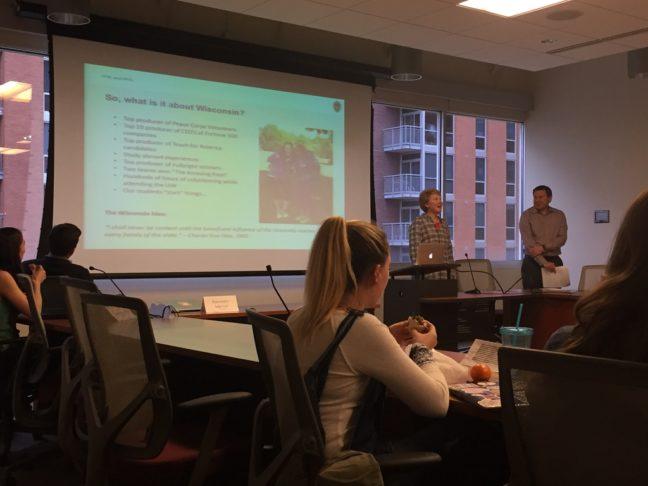The Wisconsin Experience is University of Wisconsin’s mission that education should shape people’s lives outside of the classroom.
A decade after the idea’s inception, UW officials presented to Associated Students of Madison ways in which they are working to expand it to become more inclusive.
At the Wednesday meeting, they discussed four key components in growing the Wisconsin Experience.
The Wisconsin Experience is both what UW is, and what UW aspires to provide the student body, Lori Berquam, Dean of Students, said.
“[The Wisconsin Experience] is a combination of what happens in the classroom, what happens outside the classroom — and we know that it has to be … leveraged by our institutional values,” Berquam said.
The officials laid out their institutional values that would encompass the new Wisconsin Experience: Empathy and humility, relentless curiosity, intellectual confidence and purposeful action.
“Empathy and humility” entails remaining hopeful and allowing vulnerability, said Mark Kueppers, Center for Leadership & Involvement Associate Director. The purpose of this is “for learning and growth.”
To do this, Kueppers said students should go beyond their boundaries and engage in conversation that they wouldn’t usually wouldn’t.
Berquam said to be relentlessly curious, students must be willing to discover the world around them and ask questions.
“Exercising your curiosity muscle is something we hope happens [at UW], but also something that continues on throughout [student’s] lives,” Berquam said.
Intellectual confidence doesn’t mean having to “know it all,” said Steve Cramer, Vice Provost for Teaching and Learning. Rather, he said it involves having depth within knowledge and visualizing solutions.
Purposeful action involves walking into opportunities intentionally and helping to create change, Kueppers said. It also includes recognizing privilege and being a leader with purpose.
“We talk about leadership with a purpose, not for entitlement or power, but leadership for a positive change,” Kueppers said.
These four new components are tools Kueppers, Cramer and Berquam hope students can use outside of their time at UW. The goal, Berquam said, is to have UW students be the most sought after graduates because of what UW students would “bring to the table,” though these four components.
“We want our students to develop empathy and humility for themselves and for the world. We want you to be relentlessly curious about each other, about your academics, about problems in the community,” Berquam said. “We want you to become intellectually confident and to take what you have learned here at the UW that would lead you to engage in purposeful action.”
The meeting became tense when Rep. Diego Villegas left abruptly after other representatives — who authored last month’s contentious proposal to divest from large corporations complicit in human rights abuses both in Israel and the U.S. — introduced a resolution calling for financial transparency from UW and the creation of an ethics subcommittee.
ASM indefinitely postpones divestment resolution after hours of heated debate
Villegas felt it was inappropriate to discuss the resolution after the former proposal created conflict between Jewish and Muslim students. Wednesday’s meeting fell on the Jewish holiday of Passover, so both Jewish ASM representatives and students in opposition to the former proposal were unable to debate the newly introduced resolution due to religious observance.
Villegas called the ASM body attempt to discuss the new resolution without Jewish representatives present “disgusting.”


